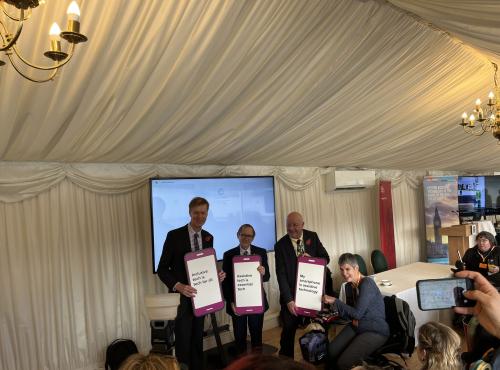Black History Month 2022
Policy Connect participates in Black History Month 2022 ‘Time for Change: Action Not Words’.
The following blog piece draws attention to racial inequalities in society and shines a light on Black people who have made a substantial contribution to some of Policy Connect’s key policy pillars.
Diversifying the future workforce
A report published by the APPG on Diversity and Inclusion in STEM in 2021, chaired by Chi Onwura MP, shows that the STEM workforce is less diverse than the wider workforce.
Black workers make up only 2% and generally diversity statistics worsen with increasing seniority. Inequality is further already built in at the start of academic careers and increases throughout a Black student’s pathways with significant attrition rates from undergraduate to PhD level. This is further compounded by the lack of visible representation on company boards and industry and academic leadership positions.
In June this year, the British Science Association (BSA) announced that Dr Anne-Marie Imafidon MBE would take over the presidency of the BSA. A computer scientist, mathematician, and recently published author, Anne-Marie founded the award-winning social enterprise Stemettes in 2013, which aims to support and inspire young women and non-binary people to take up careers in the Science, Technology, Engineering and Maths sector (STEM).
In her first presidential address in September, Anne-Marie expressed her wish for Stemettes to eventually become obsolete but also highlighted that we are still very far away from that wish becoming a reality.
With Policy Connect’s current work on the Manufacturing Commission, focussing on the sector’s future workforce, we hope to arrive at useful policy recommendations for a more inclusive and accessible STEM sector.
Tackling health inequalities
More needs to be done to tackle health inequalities across England.
A recent MBRRACE report higlights inequalities of health outcomes for Black patients compared to white patients with comparable conditions. Racial inequalities relating to childbirth has seen a stark contrast in mortality rates for Black women who are five times more likely to die because of pregnancy than white women.
Sickle cell disease is the fastest growing genetic disorder in the UK, affecting approximately 15,000 people in the UK alone. The inherited blood disorder affects predominately people from African and Caribbean descent. It causes red blood cells to become sickle shaped; resulting in significantly reduced blood flow to vital organs and is often accompanied by frequent hospitalisation due to its severity. In September 2022,the NHS Race and Health Observatory announced its research commission into the experiences of sickle cell patients within the NHS; following a parliamentary inquiry into avoidable sickle cell deaths last year, which resulted in the release of the ‘No One’s Listening Report’.
Policy Connect welcomed the Health Disparities white paper earlier this year, and will continue to explore ways to improve the experiences and outcomes of Black people in healthcare. Our Health Team has a particular focus on increasing access to healthcare, and is currently undertaking work to address racial disparities for those sectioned under the Mental Health Act. We continue to address inequalities in women’s health with our latest article alongside Dr Lisa Cameron MP, and our forthcoming parliamentary roundtable on the women’s health strategy.
Ella's Law protecting people from air pollution
Ella Adoo-Kissi-Debrah was a nine-year-old Black girl living in Lewisham, south London, who tragically died in 2013. Due to tireless campaigning by her mother, Rosamund Adoo-Kissi-Debrah, Ella became the first person in the UK to have air pollution listed as a cause of death. A report by Sir Stephen Holgate concluded that unlawful levels of pollution, detected just one mile from the family home, contributed to Ella’s death.
Rosamund knew that air pollution played a part in her daughter’s death, and she has continued to campaign for better regulation and improved air quality standards to prevent further tragedies. Rosamund has been working with Baroness Jenny Jones, who recently put forward the Clean Air (Human Rights) Bill, known as ‘Ella’s Law’, to establish the right to breathe clean air, and create duties and powers for authorities to achieve and maintain clean air in England and Wales.
Air quality is a key determinant of health. Policy Connect will continue to drive forward research, analysis, and debate to explore national and global clean air policy solutions, working with parliamentarians and stakeholders in our Health, Sustainability, and Carbon Monoxide focus areas.
Supporting Black and Disabled Students
Marsha de Cordova, Labour MP for Battersea - is a Black disabled parliamentarian committed to supporting disabled people in education, work and play.
When Marsha was Shadow Minister for Disabled People in 2019, she supported Policy Connect’s report Disabled Students’ Allowances: giving students the technology they need to succeed. She shared that she had received the Disabled Student’s Allowances (DSA) herself as an undergraduate and called assistive technology "one of the essential aspects of the DSA".
As the impact of the pandemic on Black and disabled people continues to come to light, Policy Connect’s Assistive and Accessible Technology team looks forward to continuing the work with Marsha and parliamentarians across all parties to support public policy that reduces outcomes gaps for Black and disabled students.
Diverse voices tackling climate change
At the age of 23, UK climate justice activist Dominique Palmer has tirelessly advocated for climate action through Fridays for Future, speaking at COP26 and by closely engaging with parliamentarians. She brings to light the disproportionate affects climate change has on intersectional and marginalised communities across the world and in the UK.
Her work ties together the core values of Policy Connect, showcasing the value of listening to young and diverse voices to create better public policy to improve people's lives. She's recently made efforts to ramp up parliamentary support for The Wellbeing of Future Generations Bill, introduced by Lord Bird.
With the current climate and cost of living crisis, people in vulnerable communities are disproportionally feeling the pressure from the effects of the climate change. Dominique's work also references the connection between mental health and sustainability, an ongoing theme in Policy Connect's work throughout the years.
Policy Connect continues to follow the progress of the campaigning as we dive into the research to use our evidence base to inform government and policies to minimise the effects of climate change, and lead the UK towards a more diverse, green and sustainable future.



